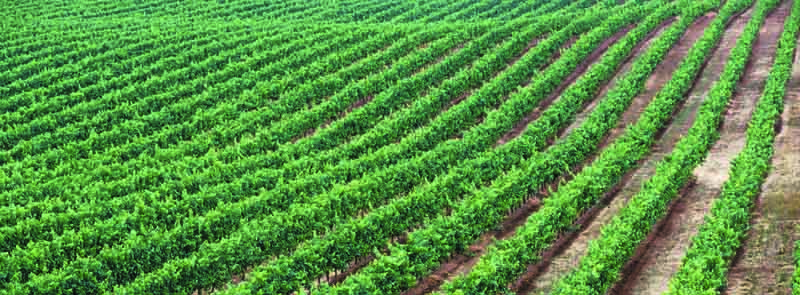The type of soil in which the vines grow has an important influence on the quality of the wine. Aspects such as texture, structure, composition and minerals in the soil differentiate the type of wine made from it. In this report, we will try to bring you a little closer to all these factors that influence the elaboration of a great wine.
 One of the most influential aspects of winemaking is the choice of the type of soil in which the vines are grown. Factors such as aromas, flavors and the character of the wine grown on that land will depend on the characteristics of the soil where the plant grows. Among all the aspects of the soil, we will focus on the most important factors that influence the fruit, such as its structure, its typology or the minerals capable of transmitting the unique nuances of the chosen soil.
One of the most influential aspects of winemaking is the choice of the type of soil in which the vines are grown. Factors such as aromas, flavors and the character of the wine grown on that land will depend on the characteristics of the soil where the plant grows. Among all the aspects of the soil, we will focus on the most important factors that influence the fruit, such as its structure, its typology or the minerals capable of transmitting the unique nuances of the chosen soil.
We will begin with a classification of the most frequent soil types in vineyard cultivation. On the one hand, we have
limestone soils
These are dry, white soils, with a great abundance of calcareous salts, from which wines of great personality will be obtained. In addition, there are
clay soils
These are yellowish to reddish soils suitable for cultivation, which produce wines with great finesse, not too high in alcohol content and with a good bouquet.
Sandy soils, on the other hand, do not retain water well and are poor in organic matter.
on the other hand, do not retain water well and are poor in organic matter, and will produce warmer wines with a large number of aromatic and less structured nuances.
Fertile and humid soils,
which will give us coarse and perishable wines where we will obtain a great quantity of grapes, although it is possible that they will not be of very good quality.
Alluvial soils, rich in nutrients and
rich in nutrients and heavy metals, which produce wines of good color,
slate soils
most frequently used in the production of white wines, and granitic soils
granitic soils
suitable for the production of red wines.
 It is also important to pay attention to the soil texture, where we will differentiate mainly between compact soil and stony soil. A compact soil is not very appropriate for vine cultivation, since it is not very permeable and does not absorb water well, while a stony soil is perfect for vines since it favors vine growth due to its excellent drainage and permeability.
It is also important to pay attention to the soil texture, where we will differentiate mainly between compact soil and stony soil. A compact soil is not very appropriate for vine cultivation, since it is not very permeable and does not absorb water well, while a stony soil is perfect for vines since it favors vine growth due to its excellent drainage and permeability.
The soil structure can be loamy when the proportion of sand, silt and clay is similar. Clayey when clay predominates. Sandy when sand predominates. Or silty when silt predominates.
Another fundamental factor to consider is the mineral composition of the soil, since the minerals present in it provide certain characteristics to the wine, and it is some of these that help to mark the character of the wine. Iron enhances the blue tones in red wines, a soil rich in calcium will make our wines more elegant, as it influences the thickness of the skin and therefore the accumulation of aromas and pigments. Magnesium, on the other hand, contributes to the harmony , silica provides graduation and fineness, while clay is responsible for the structure and consistency.
 Other important aspects are the color of the earthThe lighter the soil, the cooler it is for the plant, as it absorbs less of the sun’s rays than dark soil, and the slope of the terrainHowever, special microclimates can be created for the vineyard, with greater or lesser exposure to the sun, good drainage and little erosion.
Other important aspects are the color of the earthThe lighter the soil, the cooler it is for the plant, as it absorbs less of the sun’s rays than dark soil, and the slope of the terrainHowever, special microclimates can be created for the vineyard, with greater or lesser exposure to the sun, good drainage and little erosion.
As we can see, all these elements present in the soil influence the final result of the wine. A correct combination of all of them, together with the grape variety, climate or meteorology, will turn our grapes into differentiated wines depending on the type of soil.
Soil types in Familia Martínez Bujanda. Each of our wineries, depending on its geographical location, has different soil and characteristics. Finca Valpiedra, the Riojan winery, has alluvial soils, given its proximity to the Ebro River, which crosses the estate, complemented by a layer of limestone and boulders, which give the wine its name and retain heat, thus protecting and nourishing the vines. Finca Antigua, our winery in La Mancha, is formed by loamy, calcareous soils, poor in organic matter, qualities that, together with its high altitude, provide us with wines of great quality. And finally, at Finca Montepedroso, the winery in the Rueda DO, we have alluvial and pebble soils.




